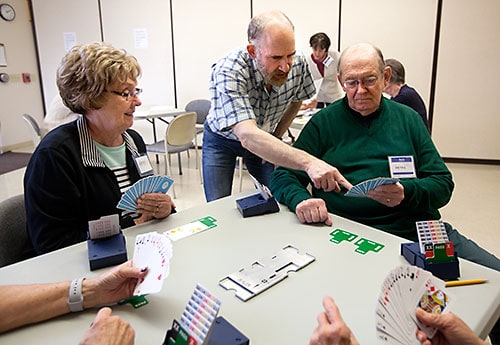Bridge exercises your brain

The game of bridge gets a bad rap. It’s an old folk’s game, they say, filled with graying players wiling away the hours around doily-bedecked card tables.
But the truth is, bridge is highly competitive and mentally rigorous, and its many enthusiasts may be getting the last laugh, literally.
“Playing games like bridge sort of forces your brain to lay down new linkages, new synapses, and it seems that the chemistry involved in making those new connections as you learn things, seems to combat the onset of Alzheimer’s,” said Claremont resident and bridge instructor David Ochroch (pronounced “Ock-rock”).
The National Institute on Aging agrees. It recently cited research by the Mayo Clinic in Minnesota indicating that strategic card games such as bridge, which exercise memory and concentration, may prevent or reduce cognitive decline in older adults.
It’s all good news to Mr. Ochroch, 58, who teaches beginning, intermediate and advanced bridge classes at Claremont’s Joslyn Center. His students range in age from their early 50s to their mid-80s, though age is really not an issue with the game. “I know people who are in the mid-90s who will wipe me right off the bridge table,” he said.
Mr. Ochroch grew up in Philadelphia and is now semi-retired from his 25-year career as an IT software contracting consultant. He has a bachelor’s degree in economics and a master’s in finance from the University of Chicago.
He never aspired to teach bridge. His card-shark grandmother taught him the game when he was a teenager, but he didn’t begin to play seriously until he was about 50. He was in San Francisco, traveling for work, and was looking for something refreshing to do during his downtime. He found the city had several strong bridge clubs.
“I said ‘Hey, this is competitive, it’s challenging, interesting and it’s social.’ And before I knew it I had a partner and was playing in tournaments.”
He spent several years playing in various games. Then, finding himself really enjoying bridge and wanting to dial back his IT work, he made a change. After earning three bridge certifications, he begin teaching.
“And it turned out Claremont, for an area that has a great deal of brain power, was seriously under-bridged,”?he said. “There’s this population of retired professors and seniors, and at Harvey Mudd there’s even a very strong national academic club that plays bridge. They’ve been winning national awards. But there’s no local bridge club.”
He approached the Joslyn Center near the end of 2016. It turned out the senior center sponsored games, but not learning programs. He volunteered and, after the city set him up with some supplies, it listed a new course and he was teaching his first class in January 2017. He began as a volunteer, but is now paid modestly to teach three classes in Claremont. He’s also branched out to surrounding cities, and seems to have established a satisfying side career.
Though to hear him tell it, he’s still a student himself.
“There is a learning curve, and beyond the advanced course is an entire life of learning,” Mr. Ochroch said. “They’re just beginning the journey.”
The game has its origins in 16th century Europe. Famous players run the gamut from tech and investment titans Bill Gates and Warren Buffett, to British rocker Alex James from Blur. “It’s a complicated game where, if you ask 10 experts about a bridge problem, you’ll get at least 11 answers,” Mr. Ochroch quipped.
Mr. Ochroch is modestly earnest in his dedication to and enthusiasm for bridge. He was patient with this reporter’s less-than-informed knowledge of the game. If there were a position of ambassador of bridge, he would be my nominee.
Asked what kind of person fits the mold for bridge play, he was animated: “For one, they have to be bit social, because bridge is a game played with a partner. There are bridge partners that way outlast multiple marriages. It’s kind of an interesting situation. These folks tend to be problem solvers, rather analytical, and very competitive.”
Physical infirmaries don’t really have an effect on a player’s game, he said. “It’s one of those games where as long as your mind is intact, you can play.” In addition to the mental gymnastics involved, there are physical demands as well, as games can go on for hours. “You play three hours of bridge and your brain’s exhausted.”
Mr. Ochroch’s clearly enjoying his later-in-life career change. He’s found a way to spread his passion for bridge to new players, and sees his role as teaching the game, and opening up opportunities for folks to meet and make new friends.
“My goal is to get all the students to the point where if they travel, they can play anywhere,” he said. “It’s like learning a language. If they travel, they can meet new people and speak the same bridge language.”
At the very least, he’s providing older Claremonters with a challenging, social activity. “It’s still a much better use of your time than sitting on the couch, eating bon-bons and watching reruns of Starsky and Hutch.”
In an effort to highlight the cognitive benefits of bridge and to give back, the American Contract Bridge League sponsors “The Longest Day,” an annual charity tournament supporting Alzheimer’s care and research. Held each June, the tournament raises money and awareness for those with Alzheimer’s and their caregivers. Learn more about this and the game of bridge at acbl.org.
To find out about Claremont’s bridge classes, call (909) 399-5488 or visit city’s website at ci.claremont.ca.us.
—Mick Rhodes
mickrhodes@claremont-courier.com










0 Comments